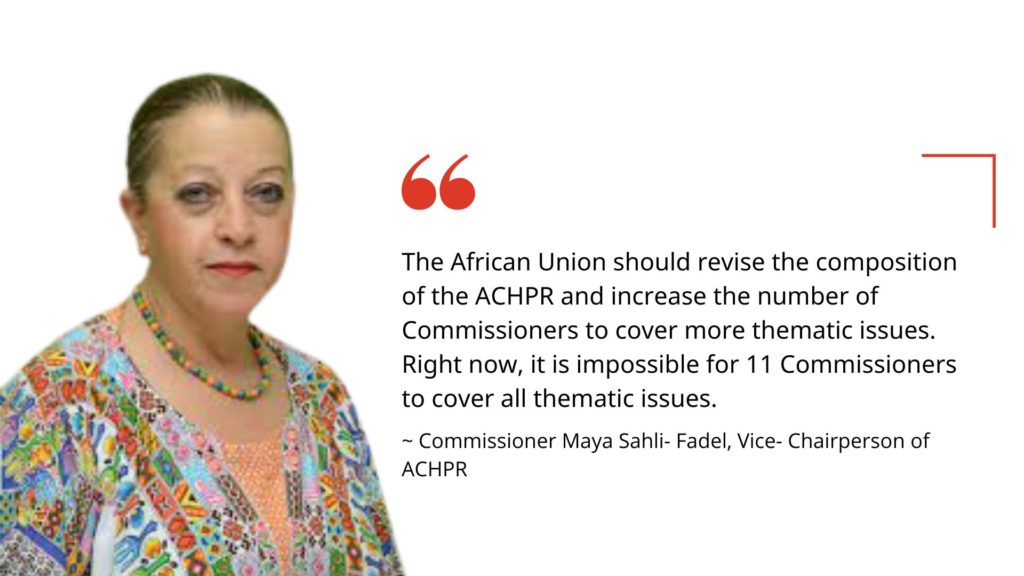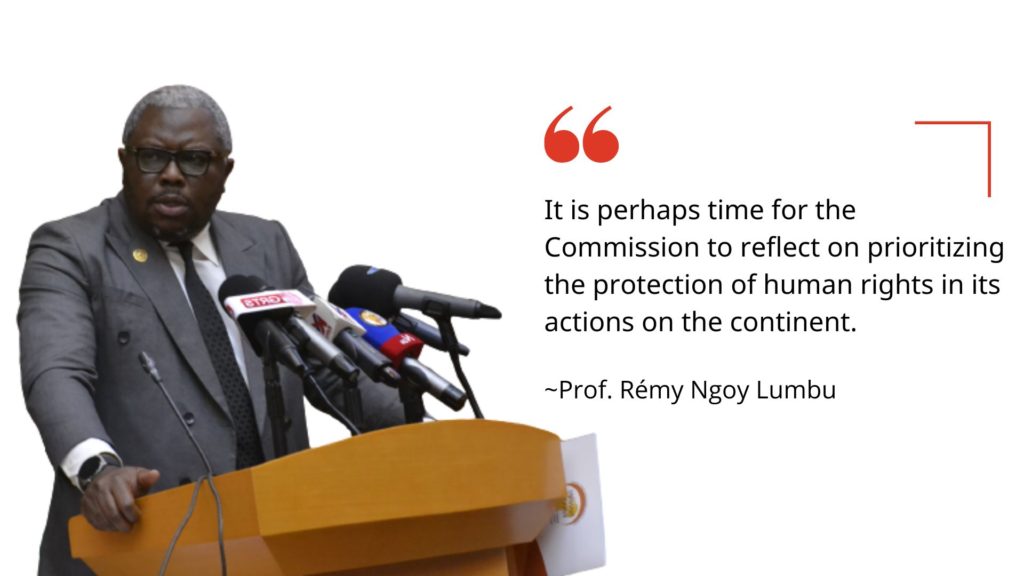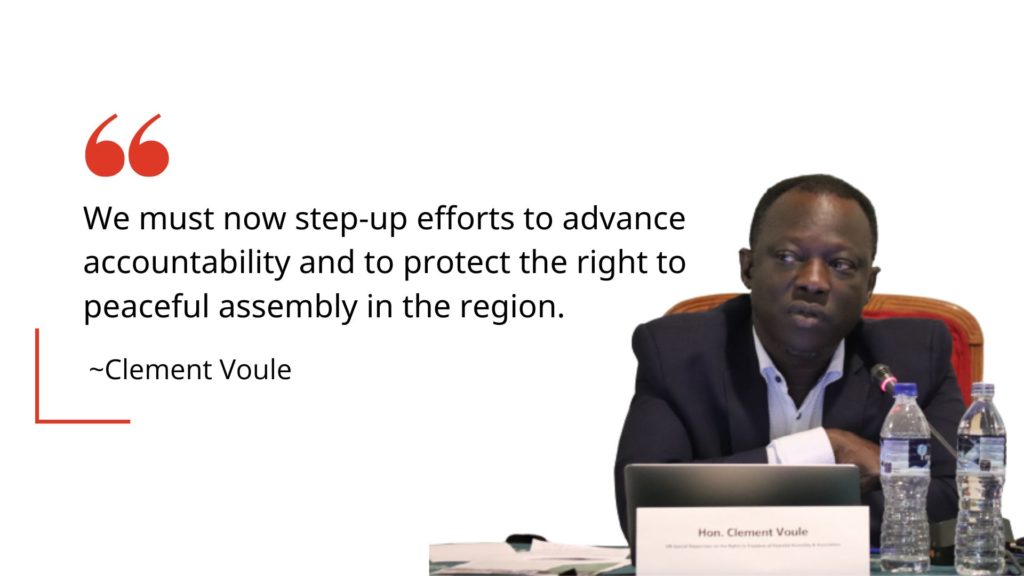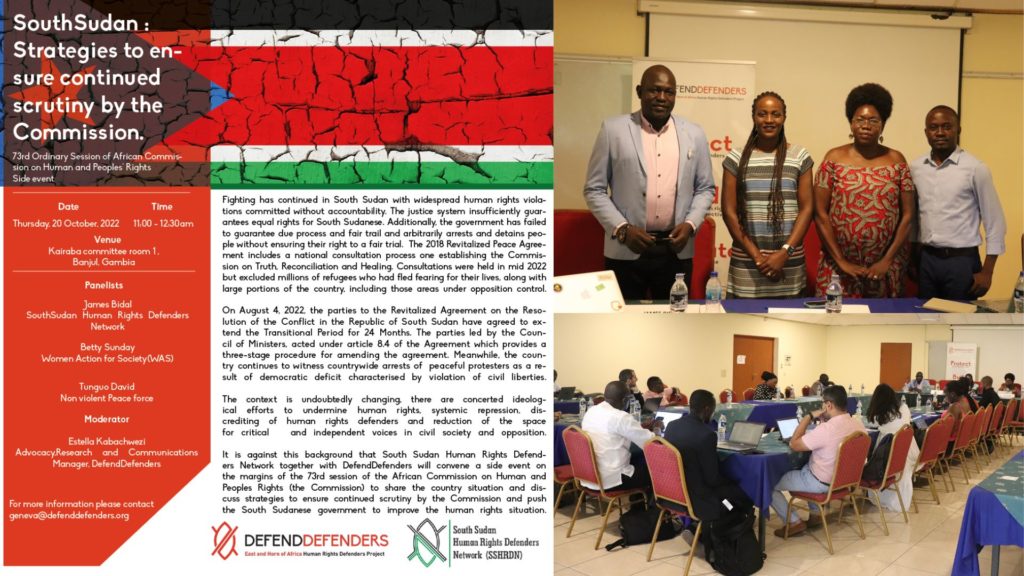The 73rd session of the African Commission on Human and Peoples’ Rights (The Commission) marked 35 years of the Commission’s commitment to the protection and promotion of human rights in Africa. This August body is at the forefront of championing and setting human rights norms and standards in Africa and I congratulate it upon this milestone. Since 2009, AfricanDefenders and DefendDefenders have closely engaged with the Commission, and have excelled on concrete outcomes towards creating an enabling operating environment for human rights defenders (HRDs) across the continent. We can refer to few examples of resolutions and instruments developed and adopted by the Commission to advise state parties to the African Charter on Human and Peoples’ Rights on setting standards and best practices in their countries.
The 73rd session was the first in person session since restrictions imposed due to the Covid 19 pandemic were lifted. To mark our presence, we facilitated 27 HRDs from the continent (representatives from Egypt, Libya, Cameroon, Nigeria, Uganda, Sudan, South Sudan, Kenya, Zimbabwe, South Africa and eSwatini) to access the Commission for strategic advocacy on country specific or thematic challenges that hinder their work.
Throughout our routine engagements with the Commission, we have consistently provided updates on the human rights situation in Africa as well as consistently spotlighted the plight of HRDs across the continent through statements, side events and panels. During the session we delivered interventions during the NGO forum, about human rights in Africa, about human rights defenders in Africa, on extractive industries, environment, and human rights violations in Africa and on the rights of women in Africa.
Reactions to our statements from state delegates of Egypt, Eritrea, and Zimbabwe demonstrates the unwillingness of African states to adhere to their commitment and obligations under the African Charter by constantly denying the plight of systemic human rights violations in their countries. I rather urge them to comply with human rights standards as stipulated in the African Charter.
Our work with the Commission is a clear indicator that in many ways, the Commission is working to effectively deliver on its mandate of protecting and promoting human rights.
However, on some issues, the #ACHPR73 fell short of pronouncing itself unequivocally on key fundamental rights and freedoms. DefendDefenders was disappointed by the Commission’s decision to reject observer status applications of three minority rights organisations – Alternative Côte d’Ivoire, Human Rights First Rwanda, and Synergía – Initiatives for Human Rights. Alongside 16 other rights organisations, we have noted that the Commission’s decision, based on the ground that “sexual orientation is not an expressly recognised right or freedom under the African Charter’ and is ‘contrary to the virtues of African values,” encourages discrimination and intolerance, and negatively impacts the work to end ongoing human rights violations against persons and communities on the basis of their real or perceived sexual orientation, gender identity and/or expression and sex characteristics.
These developments show that while the Commission has a lot of gains registered over the last 35 years, there is still much more ground to cover regarding ensuring that the fundamental rights and freedoms for all are respected all-over the continent.
I acknowledge that the Commission’s operations over the past 35 years have come with a myriad of challenges that need to be addressed to strengthen its effectiveness. One such issue is the lack of adequate human and financial resources to implement its activities fully, and effectively.The Commission remains insufficiently staffed compared to the scope and breadth of its mandate.

Member States also lack the political will to carry out the decisions made by ACHPR and other AU organs, which jeopardises the effectiveness of commission to hold states accountable for human rights violations. Moreover, the AU Executive Council’s decision to restrict the independence and mandate of the Commission in June 2018, has impeded ACHPR’s ability to effectively deliver on its mandate. This has left the worsening human rights and socio-economic crises on the continent unchecked.

Many African citizens also remain unaware about the existence of the Commission and how to engage with the AU and its organs to hold their states accountable to the provisions of the African Charter. To that end, I applaud the Commission for marking 35 years in existence by rebranding to express its commitment to enhance citizens’ engagement through improved communication, visibility, and publicity of its activities. It is indeed now to engage with Africans to enable them to claim their space, claim their rights and to speak up and speak out against human rights violations, injustices, impunity, and to hold states accountable. This can only be done if the Commission reclaims its independence and is granted more resources.
DefendDefenders remains committed to strengthening the capacity of HRDs to pursue justice and accountability for human rights violations. During the Session, we conducted several activities. In partnership with CIVICUS, we trained about 30 HRDs across the continent including members of our delegation, on how to access the African human rights system.
On the sidelines of the session, we hosted several side-events to draw attention to a plethora of human rights concerns across the continent. On 19 October, we hosted a side event on the state of freedom of assembly in Africa, which was among others, attended by Hon. Prof. Rémy Ngoy Lumbu, Chairperson of the Commission, the Special Rapporteur on HRDs and Focal point on reprisals in Africa, and Hon. Clement Voule, UN Special Rapporteur on the Right to Freedom of Peaceful Assembly and Association.

On 20 October, we hosted two side-events – on South Sudan, in which we explored strategies to ensure continued scrutiny of the country by the Commission, and on Sudan, where we discussed the current state of inter-communal conflicts in the country, the attendant human rights violations, and the situation of HRDs trapped in these conflicts. We applaud the Commission for maintaining scrutiny on South Sudan through adopting a resolution that among others condemns the human rights violations, calls for institution of measures to monitor and document the violations, calls for the operationalisation of the transitional justice institutions envisioned in Chapter V of the revitalised peace agreement.


We also hosted a side-event on the state of artistic freedom in Africa on 21 October, where we highlighted the violations against artistic freedom in Sudan and Zimbabwe and gave recommendations on how civil society and the creative arts can intersect to promote human rights.

On 22 October, we co-organised a parallel event with Committee for Justice to analyse the repression against HRDs in Egypt in the context of the country hosting COP27.
We also co-sponsored a side event organised by the International Service for Human Rights and the UN Working Group on Discrimination against Women and Girls, which explored ways to amplify the voices and activism of girls and young women across the continent. The event also discussed some of the challenges they face especially in the context of the Gambia, including female genital mutilation, early marriages, lack of female empowerment, and operating within a patriarchal system.
Our work at the Commission remains a priority, and we pledge to continue supporting the Commission to achieve its objective to protect and promote human and peoples’ rights as stipulated in the African Charter.
Hassan Shire
Executive Director DefendDefenders
Chairperson, AfricanDefenders

